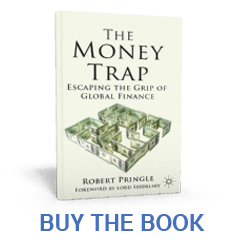The Power of Money; How Ideas about Money Shaped the Modern World
Forrest Capie, Professor Emeritus of Economic History, Cass Business School and author of the modern History of the Bank of England writes:
“Robert Pringle has written a book on money that is different from any other.”
He “draws on a long life in the worlds of money, banking, and central banking and on his wide-ranging interests beyond economics and the social sciences to history and the arts to reflect on the strange relationship money and society have on and to each other.”
He does this using different cultures across the world from the late nineteenth century, through Weimar to Japan, the U.S. and beyond to the recent global financial crisis.
“A truly innovative and stimulating study”.
See Interview with author here
For further information from Springer, the publisher, here
A message
At one level, money is simply the asset in which goods and services are priced and with which they can be bought.
Money is more than that, however. It is at the heart of the way we look at almost every aspect of our lives and so we all need to think about it.
That is, I suppose, the core message or ‘take-away’ of this survey. How we earn money and spend it sends messages out across the fabric of social spacetime not only about who we are as individuals, what our priorities are, but also about the kind of society we want. Each such action influences how resources are allocated across the whole of society. Money relates us to others. It gives us the ability to choose what we want from what is on offer, subject to our budget. From other people’s point of view, it is an instrument available to induce me to serve their interests, by offering me incentives to produce what they want, at the price/pay rate offered on the market.
Money rightly used is both liberating and a binding constraint, a tool that I use to get what I want, and a means to induce me to do what others want.
A Natural Ethic
Although our modern money has lost its bearings, it can be reset.
Capitalism is not now driven by the Protestant Ethic. Nor by a Neo-Liberal Ethic.
A society inspired by a Natural Ethic, its economy irrigated by Natural Money, would be a place of delight – a market garden.

